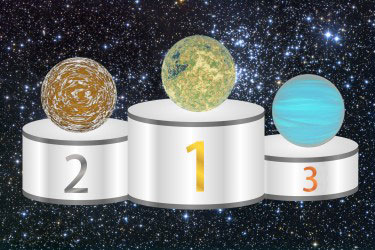 Astronomers have created a way to compare and rank exoplanets to help prioritize which of the thousands discovered warrant close inspection in the search for life beyond Earth.
Astronomers have created a way to compare and rank exoplanets to help prioritize which of the thousands discovered warrant close inspection in the search for life beyond Earth.
Oct 6th, 2015
Read more
Researchers have developed a new method for measuring the mass of pulsars - highly magnetised rotating neutron stars formed from the remains of massive stars after they explode into supernovae.
Oct 5th, 2015
Read more
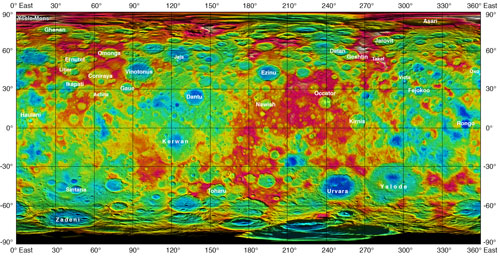 Ceres continues to fascinate researchers; in particular, the dwarf planet's surface repeatedly raises new questions.
Ceres continues to fascinate researchers; in particular, the dwarf planet's surface repeatedly raises new questions.
Oct 1st, 2015
Read more
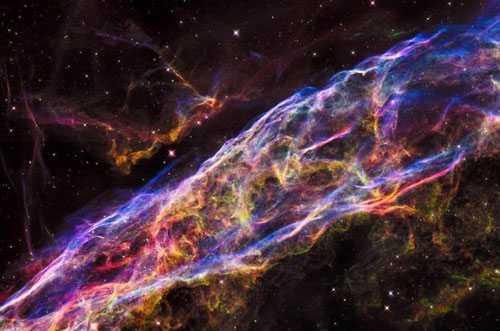 NASA's Hubble Space Telescope has unveiled in stunning detail a small section of the expanding remains of a massive star that exploded about 8,000 years ago.
NASA's Hubble Space Telescope has unveiled in stunning detail a small section of the expanding remains of a massive star that exploded about 8,000 years ago.
Sep 24th, 2015
Read more
 Scientists have come up with a new theory that may identify why dark matter has evaded direct detection in Earth-based experiments.
Scientists have come up with a new theory that may identify why dark matter has evaded direct detection in Earth-based experiments.
Sep 24th, 2015
Read more
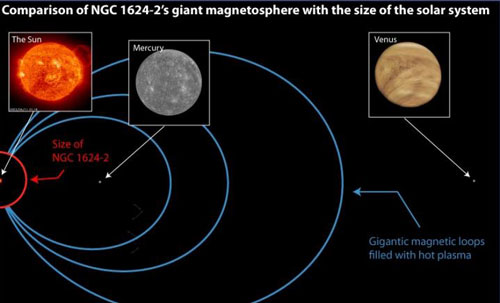 Observations using NASA's Chandra X-ray Observatory revealed that the unusually large magnetosphere around an O-type star called NGC 1624-2 contains a raging storm of extreme stellar winds and dense plasma that gobbles up X-rays before they can escape into space.
Observations using NASA's Chandra X-ray Observatory revealed that the unusually large magnetosphere around an O-type star called NGC 1624-2 contains a raging storm of extreme stellar winds and dense plasma that gobbles up X-rays before they can escape into space.
Sep 23rd, 2015
Read more
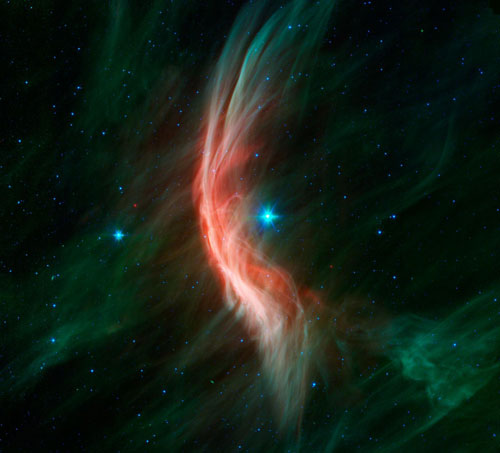 The center of our Milky Way galaxy is a mysterious place. Not only is it thousands of light-years away, it's also cloaked in so much dust that most stars within are rendered invisible. Harvard researchers are proposing a new way to clear the fog and spot stars hiding there. They suggest looking for radio waves coming from supersonic stars.
The center of our Milky Way galaxy is a mysterious place. Not only is it thousands of light-years away, it's also cloaked in so much dust that most stars within are rendered invisible. Harvard researchers are proposing a new way to clear the fog and spot stars hiding there. They suggest looking for radio waves coming from supersonic stars.
Sep 22nd, 2015
Read more
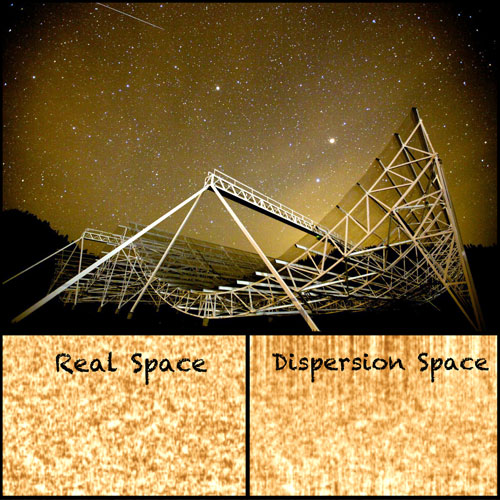 If only calculating the distance between Earth and far-off galaxies was as easy as pulling out the old measuring tape. Now researchers are proposing a new way to calculate distances in the cosmos using mysterious bursts of energy.
If only calculating the distance between Earth and far-off galaxies was as easy as pulling out the old measuring tape. Now researchers are proposing a new way to calculate distances in the cosmos using mysterious bursts of energy.
Sep 18th, 2015
Read more
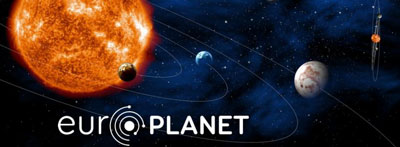 Europlanet 2020 RI will support 34 institutions in 19 countries across Europe over a period of four years. The project aims to tackle key scientific and technological challenges in modern space science by providing scientists with open access to state-of-the-art research data, models and facilities across the European Research Area.
Europlanet 2020 RI will support 34 institutions in 19 countries across Europe over a period of four years. The project aims to tackle key scientific and technological challenges in modern space science by providing scientists with open access to state-of-the-art research data, models and facilities across the European Research Area.
Sep 15th, 2015
Read more
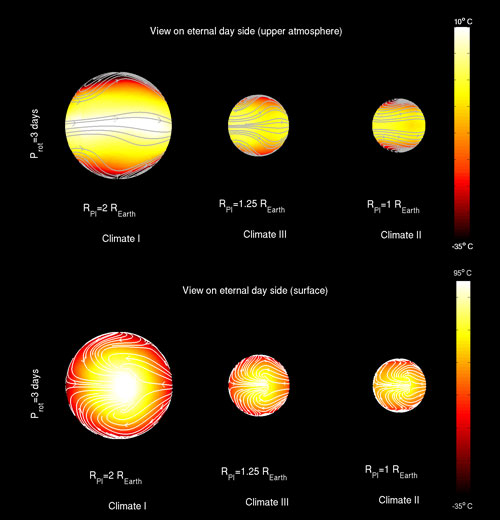 The quest for potentially habitable planets is often interpreted as the search for an Earth twin. And yet, some rocky planets outside our Solar System may in fact be more promising candidates for further research. Scientists have run 165 climate simulations for exoplanets that permanently face their sun with the same side. They discovered that two of the three possible climates are potentially habitable.
The quest for potentially habitable planets is often interpreted as the search for an Earth twin. And yet, some rocky planets outside our Solar System may in fact be more promising candidates for further research. Scientists have run 165 climate simulations for exoplanets that permanently face their sun with the same side. They discovered that two of the three possible climates are potentially habitable.
Sep 14th, 2015
Read more
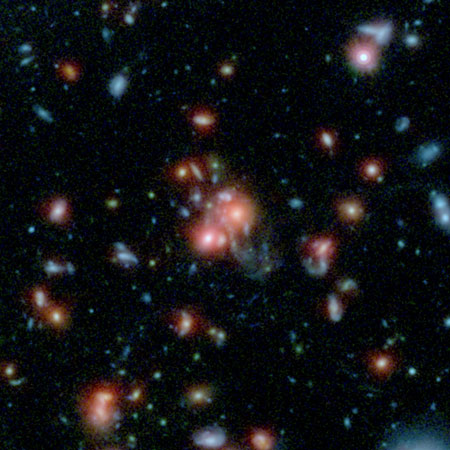 The discovery, made with the help of W. M. Keck Observatory's MOSFIRE instrument, is the first to show that gigantic galaxies at the centers of massive clusters can grow significantly by feeding off gas stolen from other galaxies.
The discovery, made with the help of W. M. Keck Observatory's MOSFIRE instrument, is the first to show that gigantic galaxies at the centers of massive clusters can grow significantly by feeding off gas stolen from other galaxies.
Sep 10th, 2015
Read more
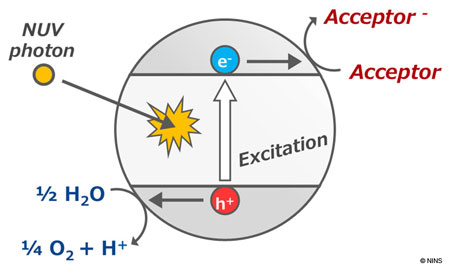 Researchers have presented a novel hypothesis that it could be possible for planets to have large quantities of abiotic (non-biologically produced) oxygen. This study is a good example of interdisciplinary studies that combine knowledge from different fields of science to promote astrobiology in the search for life on extrasolar planets.
Researchers have presented a novel hypothesis that it could be possible for planets to have large quantities of abiotic (non-biologically produced) oxygen. This study is a good example of interdisciplinary studies that combine knowledge from different fields of science to promote astrobiology in the search for life on extrasolar planets.
Sep 10th, 2015
Read more
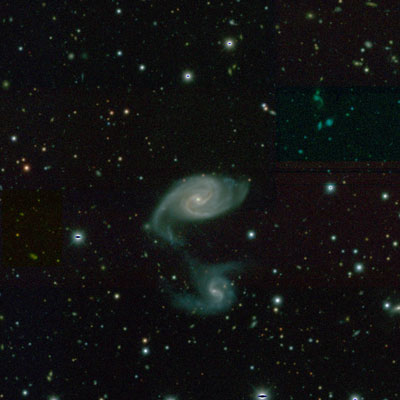 A research collaboration of astrophysicists, statisticians and computer scientists is looking to shake things up with Celeste, a new statistical analysis model designed to enhance one of modern astronomy's most time-tested tools: sky surveys.
A research collaboration of astrophysicists, statisticians and computer scientists is looking to shake things up with Celeste, a new statistical analysis model designed to enhance one of modern astronomy's most time-tested tools: sky surveys.
Sep 9th, 2015
Read more
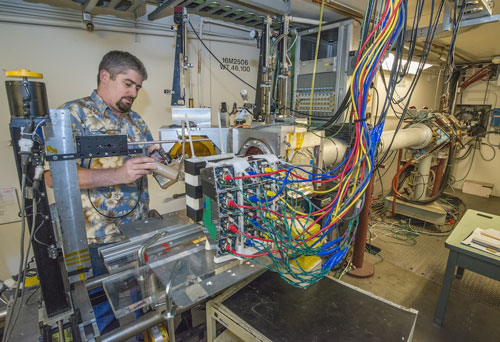 Particle accelerator blasts microprocessors with high-energy beams to toughen them up.
Particle accelerator blasts microprocessors with high-energy beams to toughen them up.
Sep 9th, 2015
Read more
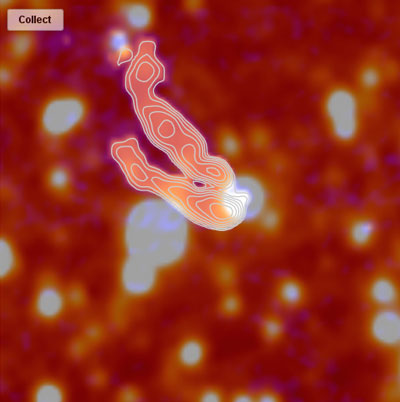 Trained volunteers are as good as professional astronomers at finding jets shooting from massive black holes and matching them to their host galaxies, research suggests.
Trained volunteers are as good as professional astronomers at finding jets shooting from massive black holes and matching them to their host galaxies, research suggests.
Sep 7th, 2015
Read more
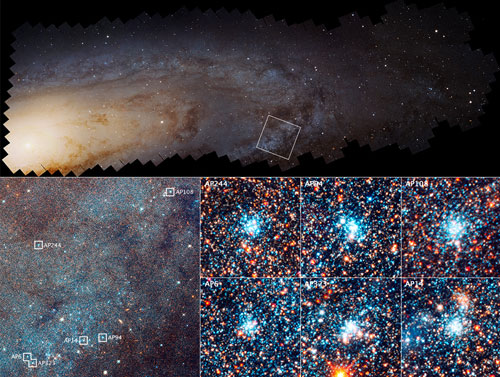 In a survey of NASA's Hubble Space Telescope images of 2,753 young, blue star clusters in the neighboring Andromeda galaxy (M31), astronomers have found that M31 and our own galaxy have a similar percentage of newborn stars based on mass.
In a survey of NASA's Hubble Space Telescope images of 2,753 young, blue star clusters in the neighboring Andromeda galaxy (M31), astronomers have found that M31 and our own galaxy have a similar percentage of newborn stars based on mass.
Sep 4th, 2015
Read more
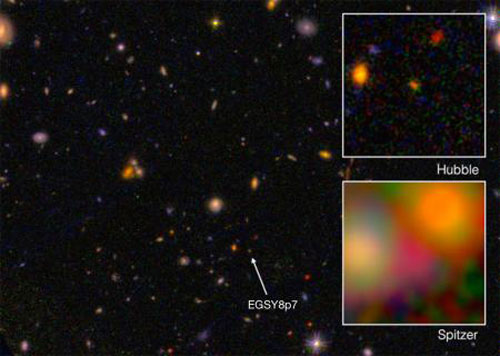 A team of researchers that has spent years searching for the earliest objects in the universe now reports the detection of what may be the most distant galaxy ever found. They describe evidence for a galaxy called EGS8p7 that is more than 13.2 billion years old.
A team of researchers that has spent years searching for the earliest objects in the universe now reports the detection of what may be the most distant galaxy ever found. They describe evidence for a galaxy called EGS8p7 that is more than 13.2 billion years old.
Sep 3rd, 2015
Read more
 Scientists have designed and created in the laboratory the first experimental wormhole that can connect two regions of space magnetically. This consists of a tunnel that transfers the magnetic field from one point to the other while keeping it undetectable - invisible - all the way.
Scientists have designed and created in the laboratory the first experimental wormhole that can connect two regions of space magnetically. This consists of a tunnel that transfers the magnetic field from one point to the other while keeping it undetectable - invisible - all the way.
Sep 3rd, 2015
Read more
 Astronomers have created a way to compare and rank exoplanets to help prioritize which of the thousands discovered warrant close inspection in the search for life beyond Earth.
Astronomers have created a way to compare and rank exoplanets to help prioritize which of the thousands discovered warrant close inspection in the search for life beyond Earth.
 Subscribe to our Space Exploration News feed
Subscribe to our Space Exploration News feed














